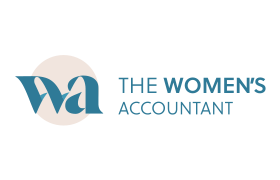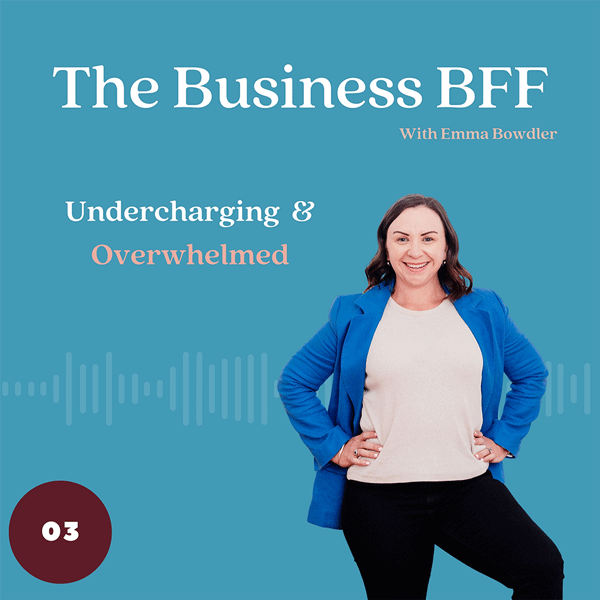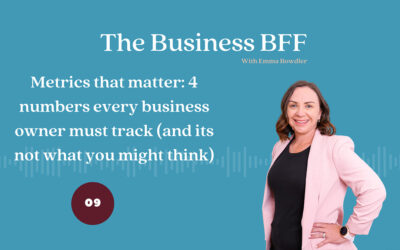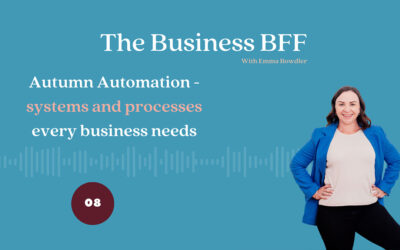The Business BFF Podcast – Episode 3:
Undercharging & Overwhelmed
13 February 2025
“Charging your worth” is one of the worst pieces of business advice out there. In this episode, Emma breaks down why tying your prices to self-worth is a fast track to burnout and inconsistent income.
Instead, she dives into the power of value-based pricing—charging for the results and transformations you deliver, not just the hours you put in. You’ll learn how to price with confidence, ditch imposter syndrome, and stop playing the comparison game once and for all.



Episode 3: Undercharging & Overwhelmed
temp
Episode Transcript:
[00:00:00] Welcome to the Business BFF, the podcast where fierce and fabulous business women come together for the kind of real talk and honest advice only your besties would give. I’m your host, Emma Bowdler, founder of The Women’s Accountant. And I’m here to help you navigate the wild world of business, finance, and life.
[00:00:21] Whether you’re scaling up. Starting fresh or just need a pep talk from someone who gets it, you’re in the right place. So grab your favorite bevy and get comfy. It’s time for a chat with your business BFFs. We’ve all heard it right, charge your worth, but today we’re going to flip that one on its head.
[00:00:42] Charge your worth can sound great, but in reality, it’s holding you back and it’s time to reframe pricing around value and not your self worth. Welcome to the Business BFF podcast. Today’s episode is a juicy one. [00:01:00] undercharging and overwhelm. Why charging your worth is unhelpful and what you can do instead.
[00:01:06] By the end of this episode, you’ll have some fresh perspective on pricing your services with some real strategies to reflect the value. An actual transformation of the results you deliver. Let’s dive in.
[00:01:27] Charging your worth is a bullshit statement that we see over and over. And honestly, I believe it’s keeping women in business small. Now I’m going to get a little bit ranty on this and it’s because I’m so passionate about. You know, making sure we are pricing around value and not around our self worth.
[00:01:51] Now, you know, this statement of charging your worth is really toxic in my opinion, and it implies that your [00:02:00] pricing is based on your self esteem. Now, for me, that is really, really dangerous. And it’s dangerous because your worth cannot be measured by money. I believe that pricing should reflect the value of the services you provide and not how you’re feeling about yourself.
[00:02:18] Now it’s also dangerous because we know that our emotions fluctuate. Now one day you might be feeling on top of the world and then the next day self doubt creeps in. We cannot let that affect our pricing decisions. Pricing based on your feelings can lead to undervaluing your work, particularly when you’re feeling doubtful about yourself.
[00:02:44] On the flip side of that, it can also lead to inflating your prices in attempt to overcompensate for that insecurity. So if we look at an example of that, so imagine that you’re a photographer. One week you’re feeling really crappy and you’re [00:03:00] questioning whether your work Is worth the 2, 000 price tag that you’ve put on your packages that you’ve been selling.
[00:03:08] And you go, Oh shit, you know, I don’t know whether I can charge that much. So you drop them and you drop your prices to 1, 200 because you’re feeling a bit low and you’re, you’ve got that feeling of self doubt. Now, imagine that the next week. Comes around and you get a dream client and you’re feeling amazing again, but now you’re stuck with that lower price and it absolutely doesn’t reflect the value that you were delivering.
[00:03:37] Or maybe you’re a graphic designer and you’ve created an amazing brand identity that helps. It helps your client attract a really high paying customer. If they price based on self doubt and charge only 500 instead of reflecting the actual value they’ve provided, they’re underselling [00:04:00] themselves and they’re limiting their business growth.
[00:04:03] Now let’s unpack this a little bit more. So I believe that the statement of undercharging your worth really misses the mark and it misses the mark because pricing based on what you think you’re worth. You know, I’m, I know that it’s there to sound really empowering, but what I know to be true is that it leads to a constant second guessing.
[00:04:31] And you know, you start overthinking your rates and that, you know, going around and around in circles, am I charging too much? Will my customers even pay this? And that’s when that doubt kicks in. When you price emotionally, you’re always going to go back and forth in this headspace. One moment you’re feeling confident and charging what you deserve, but the next you’re lowering your prices because you’re scared that you [00:05:00] might lose a client.
[00:05:01] Now, please make no mistake, I am in this space more often than I care to admit. And what I know to be true is that when we tie our self worth to our pricing, it becomes this emotional rollercoaster that we just go around and around and around on. And it’s really freaking exhausting. So if we were to look at an example, so let’s say that you are a brand strategist and you have built this amazing strategy for a client around their messaging.
[00:05:37] And as a result of what you’ve done, Their engagement shoots up by 30%. Now that’s pretty big, like that’s a big win for a client, but instead of charging what the result is worth, you find yourself thinking, Oh goodness, you know, can I charge more? What if they say no? [00:06:00] Now the truth is you should not be charging on what you think you’re worth.
[00:06:05] You should be charging on What the transformation is that you’ve created for your client. And that is what we call value based pricing. So that engagement boost is worth so much more to your client. And that’s what you should be focusing on. Not whether you think you deserve a certain price. So if we were to look at another example, and let’s say you are a web developer and you know, you’ve created this site that boosts a client’s leads by say 50%.
[00:06:40] Now you know, that new business could be worth tens of thousands of dollars to your client. Instead of charging what you, what the outcome is worth, you think, Oh, you know, that only took me a couple of hours, so I’ll just charge 500. Now, if that client is out there making, say, [00:07:00] 20 grand, thanks to the website that you’ve built, you might be sitting in that space of resent where you’re thinking, Oh, goodness, you know, I only charged 500, but you know, he, the client is making 20, 000.
[00:07:15] I know I should have charged more. So you didn’t price based on the value you delivered, you priced on the time or maybe how you felt in the moment. So here’s a quick little lesson in that. It’s not about what you feel you deserve or the time it’s taken. It’s about pricing on the impact that you’re having.
[00:07:41] So there’s just a few examples there. So why do we fall into this cycle? And what I see as a business advisor is it comes down to three key reasons. And the first reason is imposter syndrome. We’ve all been there. It’s that little voice in your head [00:08:00] telling you that you’re not good enough to charge this much.
[00:08:03] When deep down, you know that you are delivering serious value and that imposter syndrome creeps in and makes you doubt yourself. The second reason is around comparisonitis. Now, I don’t know if that’s even a word, but I think it should be. And, you know, we see that crop up when, you know, we are looking at Others in our industry and having a look at what they’re charging and, you know, we see a lot in the accounting industry, to be honest, and it’s that feeling like you need to match them, even when you know that your work is of higher quality.
[00:08:45] Now, my key point there for you to have a think about is your pricing should not be dictated by theirs. Okay, so that’s a really important one. And the third reason I see [00:09:00] that women fall into this cycle is around our gender expectations. Now society has a lot to answer for and it has conditioned women to be perceived as being transgender.
[00:09:15] Bye You know, needing to be nurturing and need, needing to accommodate the needs of others and to, you know, talking about money is a taboo topic and all of those things. And I guess what I see is that women feel really uncomfortable with Asking for more money and discussing and, and, you know, raising their prices.
[00:09:40] Now, I believe it’s time to flip that narrative on its head. And how we do that is by reframing the pricing mindset. So if we can shift that mindset and instead of thinking about how much you feel comfortable with charging, start focusing on the outcomes and [00:10:00] results that you’re delivering. That is what your clients are paying for.
[00:10:04] So, if you’re not charging to prove your worth, you’re charging to reflect the transformation you create. It’s about the value that you bring to the table and not how confident you feel on the day. Trust the results that you’ve been getting for your clients and let that be the guide to pricing your services.
[00:10:27] Now I know what you’re saying. You know, that’s all well and good and in theory, and I know that, but how do I do it? How can I, you know, increase my prices and stop undervaluing the, the value that we are delivering? So there’s a couple of ways that we can do that. And the first way is to focus on the results and not on the time it takes or the feelings.
[00:10:51] So instead of thinking about how much time you spend, focus on the outcome and all the transformation you provide. [00:11:00] How does the work that you’re delivering impact the client? So, for example, if your service saves a client 10, 000, or increases their revenue significantly, your price should reflect that value and not just the hours you put in.
[00:11:18] The second way that we can do that is to research the market. Now, what I mean by that is get a sense of what others are charging in your industry. Now, that is absolutely not to copy them, but it’s to understand where your services fit in. So a competitor analysis to see what the general price range is for similar outcomes, and then adjust based on your experience and the unique value that you offer.
[00:11:48] The third way that we can do this is by using a pricing formula. So if we can create a formula that balances not only your [00:12:00] experience, but the market value and the client results that is going to help you. Stay more consistent. So a simple method to do that would be to do a deep dive into the costs.
[00:12:13] What is the cost to your business to deliver that service? And then add that to the time that it will take you. What you can then do with that is multiply it by the value. So that way you are always factoring in the long term value you, that you are providing to your client. Another way that you might want to do this, and I’ll dive into some of the pricing strategies in a later episode, but is to create some tiered offers.
[00:12:44] So if you can have a look at your services and. Create some different pricing packages based on value tiers. So, you know, that might look like a basic, a mid tier and a [00:13:00] premium package. And then what that allows you to do is That kind of pricing method will appear to a broader audience, but it will also make the pricing more straightforward.
[00:13:14] And then what you can do with that is, with all of the different levels that you’ve got, you can then build in there different outcomes and different levels of support that you can give to your customers or clients. Another way that you can do this is regularly re evaluate your prices. And this is something that we do every single year.
[00:13:37] You know, as we know, not only is the cost of living going up, but the cost of doing business is going up as well. So it’s not just about looking at the actual costs of delivering it. It’s also making sure that we are aligning our prices with the results that we are delivering. And so having a [00:14:00] really clear communication strategy around pricing increases to your long term clients in advance.
[00:14:06] We’ll make sure that they’re informed around the added value that they will continue to receive. If today’s episode has you rethinking your pricing strategy, I’d love to hear from you. Connect with us on Instagram at the women’s accountant, and let’s keep this conversation going and start charging based on our value and not our emotions or the time it takes us.
[00:14:34] Thanks for tuning in to The Business BFF. We hope you found this episode equal parts big hug and kick up the bum. All the things a bestie is good for. Remember, you’ve got this, and we’ve got your back, like only a BFF can. If you’ve loved what you’ve heard, be sure to subscribe, leave a review, and share it with your fellow business besties.
[00:14:58] Don’t forget to follow [00:15:00] us on social media at The Women’s Accountant for more tips, tricks, and behind the scenes fun. Until next time, keep being fierce and oh so fabulous.
Latest Episodes:
Episode 9: Metrics that Matter – 4 Numbers Every Business Owner Must Track (and it’s Not What You Might Think)
Forget obsessing over revenue alone—if you really want to grow your business, you need to track the right numbers. In this episode, Emma Bowdler breaks down four key metrics that most business owners overlook but can make all the difference to your bottom line.
Episode 8: Autumn Automation – Systems & Processes Every Business Needs
In this episode, Emma breaks down the essential processes every business needs to save time, reduce stress, and create a business that runs smoothly—even when you’re not there.
Episode 7: Why Doesn’t My Profit & Loss Match My Bank Account? Here’s What You Need to Know
From GST and loan repayments to asset purchases and drawings, Emma explains the hidden cash flow killers that don’t show up on your P&L—but definitely hit your bank account.
📧 Join Our Mailing List
Never Miss
an Episode:
Join Us!
Subscribe to our mailing list to receive the latest updates from The Women’s Accountant straight to your inbox:



